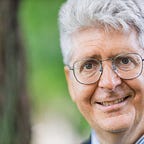Learning from a Kenyan Brother
Fernando M. Reimers
Soon after he heard the announcement that he had won the Global Teacher’s Prize, Peter Tabichi thanked his parents. Peter’s father came up to the stage, bowed as he greeted each of the other teacher finalists on the stage and Peter gave him the small statue that symbolizes the prize. Peter was born in a rural village in Kenya and lost his mother at the age of eleven. His father, a teacher, raised Peter and his sibblings. Peter became a Franciscan brother, and then a teacher. He teaches science in a rural school in Kenya, the Keriko Mixed Day Secondary School in Pwani Village. Peter’s commitment to helping his students, many of them at risk of dropping out, learn science is extraordinary. He devotes 80% of his salary to address various needs of his students. He tutors them after class and on weekends. He visits home to persuade parents to keep their children in school.
Peter is the first teacher from Africa to receive the Global Teacher Prize, an award established by the Varkey Education Foundation in 2015, to recognize teachers who have made exceptional contributions to the education of their students and, more generally, to elevate the status of the teaching profession. The previous recipients of the award were exceptional teachers from Canada, the United Kingdom, Palestine and the United States.
Over the last four years, I’ve had the opportunity to meet the recipients of this prize, as well as other finalists, and have found them to be inspiring exemplars of all that is good about the teaching profession. I have learned from them, and from the process of recognizing their excellence.
Upon receiving the award, Peter Tabichi said:
“As a teacher working on the front line I have seen the promise of its young people — their curiosity, talent, their intelligence, their belief… Africa’s young people will no longer be held back by low expectations. Africa will produce scientists, engineers, entrepreneurs whose names will be one day famous in every corner of the world. And girls will be a huge part of this story.”
These are wise words from a wise teacher, and a reminder that ninety percent of the world’s population of students in the world goes to school in the developing world. The future of humanity is to a great extent in the hands of teachers who take on jobs like the one Peter has.
The process of recognition of good teachers that is involved in the Global Teacher Prize is a reminder of the power of focusing on goodness, of spotlighting excellence in education. The Global Teacher Prize has inspired the creation of national processes of teacher recognition in several countries. The teachers who have been selected, as finalists as well as the recipients of the award, all demonstrate a commitment to educating their students holistically, to addressing multiple needs of their students, to holding high expectations for their students in spite of seemingly impossible odds.
Peter is clearly an outlier in wanting his rural students to learn to think like scientists in a country where progress is more often measured by the percentage of students who enter school, who transition from one grade to the next, or by the number of words per minute students can read and by measures of basic comprehension of language and math. Peter knows that it takes much more than those basic measures of educational success to empower poor students, that a holistic view of the competencies students will need to develop in a rapidly changing world and where the requirements for civic and economic participation are increasing is essential to cultivating student’s agency and efficacy. With his work, Peter demonstrates that it is possible to succeed in holding his students to these high expectations, when those who teach hold themselves to similarly high expectations to support their students. Perhaps the biggest lesson we can learn from brother Peter is that the poor educational outcomes of most of the children of the poor in the developing world, where most children live, reflect the poverty of aspirations of those, teachers, governments, society more generally, who could take responsibility to help all students learn in the way Peter Tabichi does. His example is a powerful reminder that we have a choice about how to educate the future of humanity.
